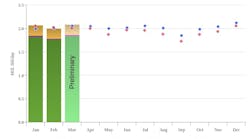Uchenna Izundu
International Editor
LONDON, Sept. 7 -- The UK Health and Safety Executive should investigate Royal Dutch Shell PLC's safety operations in the North Sea because its change management process is affecting safety on the assets it plans to sell, charges UK trade unions Unite and the Oil Industry Liaison Committee.
Shell union employees complain that there is poor communication from the company regarding the sale of the Cormorant Alpha-Dunlin Alpha and the Tern, Eider, and North Cormorant installations. In a letter to senior managers earlier this week, offshore staff said that as a result of recent departures attributable to the prolonged nature of the divestment issue, "Many platforms areas are now not fully covered by trained and competent people, and certain HSE safety critical roles are not fully supported.
According to the unions, positions lacking adequate staff are control room operators, shift supervisors (process), instrumentation technical custodians and responsible persons (electrical), and reportedly a lack of suitably trained Fire Team Leaders.
The unions said that as key personnel have left in protest at treatment they received, gaps appeared in critical safety positions, which could leave those left behind unable to cope in emergency situations. The unions want to know if Shell can comply with the safety elements of PFEER (prevention of fire and explosion, and emergency response) Regulations 1995 for offshore installations.
Shell staff members also are unhappy that the company has discontinued its "preferred HR principals for divestment and acquisition" system that it has used for 8 years when selling other assets.
Contact Uchenna Izundu at [email protected].
